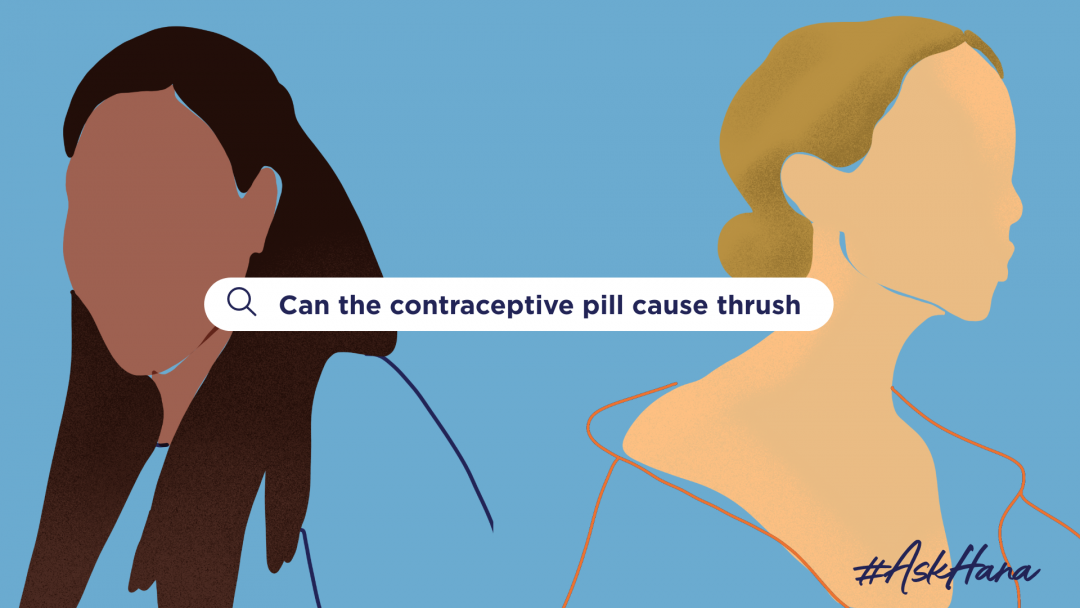Whether you call it “thrush”, a “yeast infection” or “vulvovaginal candidiasis”, there’s no denying that the itchiness, irritation and change of discharge can be really uncomfortable and just isn’t something you want in your life.
Birth control pills don’t cause yeast infections in and of themselves, but they can sometimes increase your risk of developing a vaginal yeast infection by disturbing the natural hormonal balance of oestrogen and progestogen. Read on to find out everything you need to know about thrush, including what causes it, treatment and how to prevent it happening again.
What is thrush?
Thrush is a common yeast infection that affects both men and women. It’s not classified as an STI and is usually harmless, but it can be unpleasant and recurring.
Thrush is caused by an overgrowth of yeast known as Candida albicans, which lives naturally in the bowel and in small numbers in the vagina. Around 75% of women will have vaginal thrush in their lifetime.
For people with vaginas, symptoms include irritation and itching around the vagina, soreness or a stinging sensation during sex or when urinating, a white vaginal discharge (often desribed as being of a “cottage-cheese” texture) that typically doesn’t have an unusual odour, and redness or swelling of the vagina or vulva.
What causes thrush?
The overgrowth of Candida albicans can be caused by a number of things: having recently been on antibiotic medication; taking oral contraceptive pills; pregnancy; changes in your menstrual cycle; relevant vulval skin conditions like eczema; as well as general illnesses such as iron deficiency or immune system disorders.
Contraceptive pills & thrush
Contraceptive pills may change the hormonal environment inside the vagina, which can give rise to a yeast infection.
There are two types of contraceptive pill: the combined pill, which contains a synthetic form of the hormone progesterone (called a progestogen) and a synthetic form of oestrogen; then we have the progestogen-only pill (also called the “mini pill”). Find out more about the different contraceptive pills here.
Hana® is a progestogen-only pill containing the active ingredient desogestrel. When taken correctly, it helps prevent pregnancy by working to consistently inhibit ovulation and alter your cervical mucus. Vaginal infections are an uncommon side effect of Hana®, but it can affect up to 1 in 100 people.
The side effects of the “mini-pill” vary from person to person. To read more about potential side effects, head over to our other article here. If you experience any side effects, talk to your doctor or pharmacist.
Similar to oral contraceptive pills, the patch and the vaginal ring also release hormones into the body that can cause yeast overgrowth.
Other factors
Typically, the type of birth control you use isn’t enough to prompt a yeast infection alone. Normally, it’s in conjunction with other factors such as stress, wearing a tampon or sanitary pad for too long, using irritating bath products, detergents or lubes, or wearing tight, synthetic or wet clothing.
Other conditions that may encourage a yeast infection are high blood sugar levels, pregnancy, a weak immune system, antibiotics and stress.
How to treat a yeast infection
When treated, most yeast infections clear up within a week or two (though this may take longer if your infection is more severe). There are many over the counter treatments that can be used to ease your symptoms.
Anti-fungal creams usually come as a one, three or seven day dosage. You should start to feel better after three days; however, keep taking your treatment for the full course even if you’re feeling better. If you don’t feel any relief in your symptoms after seven days, seek medical advice.
When using an anti-fungal cream, sexual activity should be avoided to prevent further aggravation of the area. What’s more, antifungal medications can make condoms and diaphragms ineffective. If you’re on your period during this time, tampons should also be avoided until symptoms have cleared.
If your symptoms haven’t cleared up within seven days, your doctor may prescribe a prescription-strength antifungal cream; but antibiotics will be prescribed as a last resort.
How to prevent a yeast infection
There are some steps that can be taken to prevent a yeast infection from occurring. For example, use natural detergents and soaps, each food rich in probiotics like natural yoghurt, limit alcohol consumption, wear loose-fitted cotton underwear and frequently change sanitary pads and tampons. You may also consider switching to a lower dose hormonal contraceptive pill.


